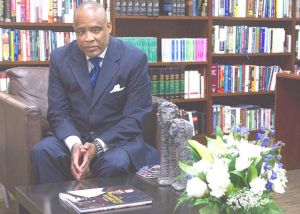Posted: Monday, May 6, 2013 6:59 am | Updated: 7:35 am, Tue May 7, 2013.
By SHADI JAFARI and AMY DePAUL
Orange County made national headlines last year with the news that an African-American couple, both police officers, moved their family out of its Yorba Linda home after repeatedly being targeted in attacks that had all the earmarks of racially motivated crimes.
The family decided to pull up stakes after attackers — who are still at large — smashed windows and fired acid pellets at their home and slashed the tires on their cars. In addition, the couple’s children were subjected to racial epithets, according to the Orange County Human Relations Commission.
“No one else in that neighborhood was targeted but them,” said Rusty Kennedy, executive director of the commission, which quickly deemed the incidents a hate crime, defined as a criminal act motivated by the victim’s race, religion, gender or sexual orientation.
But local police saw the incidents differently, classifying them as mere acts of vandalism. Further, police could not link anyone to the attacks, and the case is now closed.
“There were no witnesses, no vehicles seen or heard, and we didn’t have any direction to go in,” said Detective John Hoetker of the Brea Police Department, which served Yorba Linda last year.
The Yorba Linda case is a recent example of the many challenges involved in tracking, solving and prosecuting criminal acts that appear to be motivated by bigotry, despite hate crime statutes designed to help law enforcement.
A Powerful Message
Hate crime charges can send a powerful message condemning bigotry, and they can be used to add time to a defendant’s sentence, sometimes turning a misdemeanor into a felony, said Jaime Coulter, assistant district attorney in Orange County.
In 2011, Orange County law enforcement agencies reported 81 hate crime “events” during which at least one offense was committed — 106 offenses altogether, according to the California Office of the Attorney General. However, that year only 27 hate crime cases were referred by police to prosecutors, and prosecutors won only 10 convictions.
“A hate crime is one of the more difficult cases to make,” said Scott Thorpe, CEO of the California District Attorneys Association.
Thorpe said sometimes it’s hard to find a suspect, particularly in an act of vandalism. Further, it’s difficult to prove that bias is behind the intent of the crime, he said.
The resulting difficulty in prosecuting hate crimes has been felt nationwide. For example, Texas has netted less than one conviction a year statewide.
Another reason hate crimes don’t always make it to a courtroom is prosecutors often choose cases based on their chances of winning, according to UC Irvine’s Valerie Jenness, dean of the School of Social Ecology and professor in the Department of Criminology, Law and Society. Therefore, Jenness said, many hate crimes cases that lack a suspect or sufficient evidence are never filed.
Making the Case
One way to prove the intent of a crime is to find racist or homophobic writings on the suspect’s Facebook page or to determine whether there were prior threats in which race or orientation were mentioned, Thorpe said. Sometimes a suspect in another case will provide vital information about an unsolved hate crime, he said.
In other cases, the suspect may make a racist comment while committing the crime. For example, a man who walked into an Orange County 7-Eleven store and suddenly punched two Latino men while cursing at them for being Mexican pleaded guilty last year to two felony counts of hate crime battery causing injury. He was sentenced to two years and eight months in state prison.
The impediments to hate crime convictions begin long before the prosecutors become involved. Perhaps the most significant issue is underreporting by the victims themselves.
Victims are reluctant to report hate crimes to police for a variety of reasons, according to the International Association of Chiefs of Police. Some gay and lesbian victims aren’t prepared to come out publicly, and sometimes victims don’t speak English.
“There are many more instances of hate crimes out there than we report annually, and that is because many people do not feel comfortable talking about their experiences and do not feel as though anyone, including law enforcement, will even do anything to change it,” said Kennedy.

The Rev. Mark Whitlock of Christ Our Redeemer AME Church in Irvine, which has the largest African-American congregation in Orange County. (Photo by: Phuc Pham)
The Rev. Mark Whitlock of Christ Our Redeemer AME Church in Irvine, which has the largest African-American congregation in the county, echoed Kennedy’s comments.
“There are specific reasons why the Africa American community does not go to the police when they have been a victim of a hate crime. It’s the thought that, ‘Well, they don’t really care and won’t do anything,’ and the sad part is, they are usually right,” Whitlock said.
The Listening Tour
In order to combat racism and raise awareness in Orange County, the Human Rights Commission and Christ Our Redeemer sponsored a series of what they called “listening sessions” in various locations this year. These sessions were open to the public and were intended to build a sense of community and bring those who have been subject to harassment and discrimination to a safe place where their voices could be heard.
A report of the sessions found that about “21 percent of the African-American youth … reported experiencing incidents of harassment and racial profiling” and that “nearly 30 of the 144 participants reported being racially profiled by the police in Orange County” and by their schools, teachers, peers and community leaders. The commission hopes to send every city council the final version of the findings.
“The listening sessions were absolutely overwhelming,” said Whitlock. “There are victims of skinheads, victims of gang violence, and individuals who have been harassed by their own peers. Racism is still alive and well in our community and worldwide. We all need to learn tolerance.
Past Incidents
Orange County has on occasion sent a message of intolerance to minorities — Yorba Linda in particular. For example, in 2011, hundreds of residents and officials gathered to protest a Muslim event in Yorba Linda, with some participants jeering and taunting Muslim families with shouts of “go home” or “Mohammad was a terrorist”
In 2010, Yorba Linda’s City Council also was the first in the county to endorse Arizona’s controversial immigration law, considered by many to permit profiling of Latinos. Yorba Linda is 1.3 percent African-American, according to census data.
And the Orange County Board of Supervisors last year discussed abolishing the Human Rights Commission. But Kennedy pointed out that if not for the commission, whom the African-American family contacted with their story, there would have been no response to the incidents.
“That family would have left, and nobody would have known what happened,” Kennedy said. “Having a human rights commission gives people hope.”
For now, hate crime laws remain a valued, though infrequently applied tool in a prosecutor’s toolbox, experts say.
“Hate crime laws are useful,” said Thorpe. “The more options prosecutors have for holding people accountable, the better. It doesn’t mean they’re all equally easy to prove.”
Amy DePaul is a Voice of OC contributing writer and lecturer in the UC Irvine literary journalism program. You can reach her directly at depaula@uci.edu
Shadi Jafari is a journalism student at UC Irvine.
The original article is published by the Voice of OC.
Read more about the Listening Sessions and the Draft Listening Sessions Report by clicking here.

